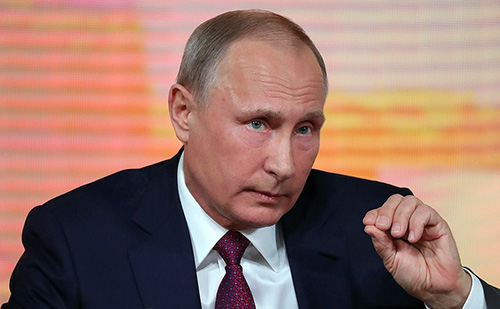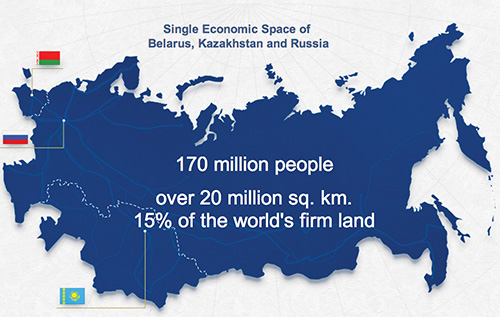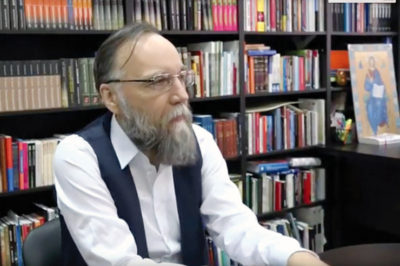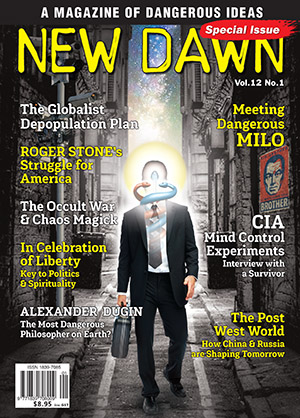From New Dawn Special Issue Vol 12 No 1 (Feb 2018)
The Russian thinker and ideologue Alexander Dugin, who has been working to shape Russian political and intellectual life over the course of four decades, has attracted many supporters and detractors. They are deeply divided, and yet they share one thing in common: both see him as an almost mythological figure.
To his enemies, he is a demon: the dark hand behind Putin’s throne, an occult fascist pushing Russia back into totalitarianism and expansionist aggression, with tentacles reaching into the rising populist nationalism of Europe and especially among the American Alt-Right and the Trump administration [2017-2021]. To his supporters, he is a hero for our age: a master of philosophy and the esoteric who is building the foundations for a new sociopolitical paradigm that will provide true freedom for all the peoples of the world and deliver them from the ravages of globalisation and neoliberalism.

While my own view of him is more sober and nuanced, I confess that it is closer to that of his supporters, given that I was the one who supervised the publication of the first translations of Dr Dugin’s books into English. I’ve been an avid follower of his work since the late 1990s, when I first discovered Arctogaia, the first website to offer his writings in (crude) English translations made by well-meaning Russian volunteers. When I stumbled across this site, I eagerly read the essays, which were an unusual, but thought-provoking, mix of ideas drawn from the European New Right, Traditionalism, Russian Orthodox mysticism, the occult, runology, geopolitics, Soviet Communism, and anarchism, among others.
It seemed that this thinker was interested in all the same things that I was, but which I had never considered combining as he was doing – and which produced some fascinating results. I have long been of the view that the political categories of ‘Left’ and ‘Right’ are unnecessarily restrictive, for instance, and that the way to discover new paradigms beyond neoliberalism lies in something that would draw on both ‘sides’ – and this is something that Dr Dugin was actually doing.
Indeed, much of the confusion regarding Dr Dugin’s reception in the West stems from his attempt to synthesize many disparate and seemingly contradictory ideas and schools of thought. This is further hampered in the Anglophone world by the fact that, of his many dozens of books and hundreds of articles that have been published in Russian, and which deal not only with politics and philosophy but with topics as diverse as religion, esotericism, anthropology, sociology, and history, only a handful have so far appeared in English translation, leaving enormous gaps for foreign readers. Dr Dugin himself has been attempting to address this problem by presenting a seemingly endless series of websites over the years which present his views and those of his followers, the latest being Geopolitica.ru.
Regardless of these efforts, however, many in the media continue to depict Dr Dugin as a force threatening the world. One might be tempted to laugh at such hyperbole until one remembers that the US Treasury Department recently placed him on its list of officially sanctioned individuals.
I’m pleased to say that on the one occasion when it was my pleasure to meet Dr Dugin in person, at a sociological conference in New Delhi in 2012 (the topic of which, interestingly, was “After Western Hegemony”), there was nothing obviously demonic about the man. He wasn’t wearing black (only a casual suit), and there were no FSB agents or familiars following in his wake. Indeed, he was quite mild-mannered, amiable, and soft-spoken. The only thing ‘mystical’ about his appearance was his famous beard – which marks him as a raskolnik, or “Old Believer,” that sect of the Russian Orthodox Church which rejected liberalising reforms that were introduced in the seventeenth century. Contrary to those who claim that Dr Dugin’s professed beliefs are nothing more than a show, I can attest that he was diligently following the fasting days, and while I ordered a normal dinner and beer, he restricted himself to nothing more than some fruits, and offered his prayers before eating. But that evening and into the next day, we had many hours of conversation that, like his writings, traversed the entire spectrum of knowledge, from politics and current events to philosophy and religion.
In order to really understand what he is doing, one has to trace the origins of his ideas back to a rather unorthodox interpretation of the Traditionalism of René Guénon and Julius Evola – and to understand that, one must know something about Dr Dugin’s life.1
Dr Dugin was born in Moscow in 1962 to a father who was a Colonel-General in Soviet military intelligence and a mother who was a medical doctor. In his book Putin vs Putin, he mentions that one of his ancestors was Savva Dugin, an Old Believer who was beheaded for calling for the restoration of the Orthodox Patriarchate and for condemning secular political authority.2 In 1980, while a student at the Moscow Aviation Institute, he discovered Traditionalism, and became embroiled in the tiny Traditionalist subculture which existed in Moscow at that time, having been inspired by those Traditionalist books which, somewhat mysteriously for a Communist-supported institution, had been acquired by the Lenin State Library decades earlier.
Given that atheism was still the officially prescribed doctrine of the Soviet Union, these activities were obviously restricted to the subversive underground. Dugin produced the first-ever translation of a Traditionalist text into Russian, Julius Evola’s Pagan Imperialism, in 1981, which was circulated in samizdat form. Dugin also formed a band, Hans Zivers, which in today’s terms would be described as dark neofolk – a single album of this music, Blood Libel, has since been released on CD and on YouTube. In 1983, word of these performances reached the KGB (which condemned them as “mystical anti-Communist songs”). As a result, Dugin was briefly detained, and then expelled from the Aviation Institute. Undeterred, he continued to study Traditionalism, supporting himself with a day job as a street sweeper.
After a brief foray into politics in the nationalist party Pamyat during the late 1980s – the first party other than the Communist Party that was tolerated in the Soviet Union – Dugin began associating with the school of thought which has been called the “European New Right,” first established by the Frenchman Alain de Benoist, that was (and is) working to establish a true intellectual and political alternative to neoliberalism in Europe. Although an opponent of the USSR during the 1980s, his earliest trips to Western Europe at this time showed him that, as bad as it was, the West was in far worse shape, having lost its deeper sense of meaning and succumbed to the wiles of American-style consumerism and popular culture. This had the somewhat ironic effect of converting him into a late supporter of the Soviet Union. Although Dr Dugin is not, and has never been, a Communist, he came to recognise at this time that the USSR, as flawed and problematic as it was, had at least protected Russia and its satellite states from the onslaught of neoliberalism and nihilism that had overtaken the West in the post-war years. Likewise, he realised that the demise of the Soviet Union meant that the only significant check on American hegemony had been neutralised, and the United States was now more or less free to have its way with the rest of the world.
During this period, Dugin worked with a number of organisations that opposed the new, democratic Russia that had been brought into being under the auspices of Boris Yeltsin, although in 1993 he began what was to become his defining activity of the 1990s, when he became one of the founders of the National Bolshevik Party (NBP). The National Bolsheviks claimed the legacy of the groups and thinkers which had gone by that name in both Germany and among Russian exiles during the 1920s, who had sought to combine elements of Communism with nationalism and traditional values. In practice, however, the NBP was more of a group of pranksters than a serious contender for political power, and Dugin left it in 1998.
Eurasia
In the 1990s Dugin first embraced the school which was to define the next phase of his political activism: Eurasianism. Eurasianism was a doctrine first developed among the Russian émigrés in Europe during the 1920s. It is a complex theory, but it essentially held that Russia is a unique civilisation more closely associated with Asia than with the West.3 Dr Dugin adopted these ideas and furthered them by claiming that a new Russian empire, comprising the same territories which had formerly been incorporated within the Soviet Union, was required in order to form a bulwark against American and NATO hegemony, which threatened not only Russia but the entire world with the imposition of a monoculture based on nothing more than the values of globalisation and the marketplace. The fundamental conflict for Dugin, as it was for many geopolitical thinkers before him, is between the conservative, land-based powers of the ‘World-Island’ of Eurasia and the liberal, maritime-based powers of the United States and its allies.

Toward this aim, in 2001 Dr Dugin established the International Eurasia Movement, the organisation which he continues to lead up to the present. While not uncritical, Dugin has always praised Vladimir Putin as the shepherd who, if he follows the trends he has initiated toward their more radical conclusion, will inaugurate the new Russian imperium. Dugin’s precise relationship with Putin has long been a bone of contention among Russia observers, with some going so far as to claim that Dugin is “Putin’s brain.” While this is certainly an exaggeration, as Dugin has never held any official position at the Kremlin, it is nevertheless true that he has been in the Kremlin’s orbit for many years.
When I asked Dr Dugin about this relationship when we met in 2012, he told me that he has been in contact with Putin and there are people at the Kremlin who are interested in his geopolitical ideas, but who don’t have any time for his Traditionalist or philosophical ideas. Exactly how much influence he has exerted is difficult to say, but one can definitely detect some very ‘Duginesque’ language when Putin gives speeches extolling Russia’s role as the guardian of conservative values, or calling for a multipolar world, with many nations – Russia being chief among them, of course, but also including other powerful nations such as China, Brazil, and Iran – sharing hegemony over their respective regions, as opposed to the present order, which is viewed as a unipolar world in which the United States holds sway over the entire globe. Such concepts could be taken straight from Dugin’s writings. Similarly, Putin’s geopolitical strategy in the formation of the Eurasian Economic Union, or in his approach to countries such as Georgia, Syria, and Ukraine, very much bear the marks of Dugin’s geopolitical thinking. How much of this is merely coincidence and how much is actual influence is unclear, but political events of recent years have shown that the trajectory of Russian politics is very much in keeping with Dugin’s own prophecies.
Dugin does not see the political order that he is calling for as something that will benefit only Russia, but something that will in fact save all of humanity from destructive, homogenizing forces. And it is here that we end up returning to the Traditionalism with which he began his career. According to the Traditionalists, each of the world’s major religions is a manifestation of a single metaphysical truth, but expressed differently according to the cultural and geographical demands of each people to which it is revealed. No religion can therefore claim to be the “one true faith,” but at the same time, there is a specific religion that is most appropriate for every people and which was created specifically for them. Dr Dugin has expanded the Traditionalist worldview to politics. For him, it is not simply a matter of religion, but also the case that particular political systems and cultural norms are appropriate for each people of the world, and that these elements cannot be transferred from one people to another without either cutting them off from their metaphysical roots, resulting in alienation and decay, or destroying them altogether.
The political implications of this view should be clear. The United States, using its unprecedented military and economic might, is attempting to export its political and economic systems and its culture to every corner of the globe in the pursuit of a New World Order in which the entire planet will, in effect, become American. (One must hasten to add that Dugin has made it clear in various writings that he does not regard the American people themselves as the enemy, but only the political and economic forces which rule over them, viewing ordinary Americans as being their first victims.)
This Manichean worldview thus pits America, and those who support it, in a fight to the death against those who oppose it – and for Dugin, unsurprisingly, Russia is at the centre of the opposition to their designs, and ideally, should be coordinating it all. In political terms, this means that anyone who opposes the US should be supported, even when their aims do not precisely align with those of Eurasianism. This is not a war between Left and Right as usually understood, since Dugin favours nations, individuals, and groups from both sides of that divide, but rather as a war between neoliberalism and non-neoliberalism.
Trump & the Alt-Right
In his videos and articles, Dugin has made it clear that he genuinely does think Donald Trump could be the one to banish the globalist elites from Washington, cease America’s overseas military adventures, and reach a new understanding between America and Russia; even if he fails in these efforts, Dugin surely sees him as someone who has thrown the American political establishment into chaos, to the benefit of Russia and other dissenters around the world.
As for the Alt-Right, Dugin has made it clear in many of his writings that he rejects racialism (he has maintained there is no objective standard by which to measure the value of one race against another), which is so dear to the Alt-Right, and yet, as already mentioned, the crucial factor for him is only whether a given group is for or against the current neoliberal order. Given that, at least at its best, the Alt-Right represents a rejection of neoliberalism and of the foundations of the American order more generally, it is in keeping with Dugin’s usual doctrine to overlook his points of disagreement with them in the hope they might serve to weaken the grip of neoliberalism over America, and in turn the world. Nevertheless, the efforts of some journalists to paint Dugin as some sort of guru to the Alt-Right is nothing more than propaganda – because of his rejection of racialism, Dugin is much more often disparaged than studied by the denizens of the erstwhile Alt-Right ‘movement’.

This article barely scratches the surface of Dr Dugin’s thought in all its facets, but I have attempted to convey something of his overarching worldview. Dugin is not the sort of thinker we are accustomed to dealing with in the Anglophone world – he is more akin to the apocalyptic Orthodox writers of the nineteenth century, such as Vladimir Soloviev, than he is to a typical Western political theorist. Regardless of what one thinks of his views, understanding him offers a unique perspective on Russia’s actions as well as the hopes and dreams of anti-liberal political dissidents around the world.
Footnotes
1. Much of the following account of Dr Dugin’s early life is summarised from Mark Sedgwick, Against the Modern World: Traditionalism and the Secret Intellectual History of the Twentieth Century, Oxford University Press, 2004, 222-237; the rest is from my own research.
2. Alexander Dugin, Putin vs Putin: Vladimir Putin Viewed from the Right, Arktos, 2014, 66
3. An excellent introduction to both historical and present-day Eurasianism was recently published: Charles Clover, Black Wind, White Snow: The Rise of Russia’s New Nationalism, Yale University Press, 2016. The best introduction to Dugin’s own conception of Eurasianism in English to date remains: Alexander Dugin, Eurasian Mission: An Introduction to Neo-Eurasianism, Arktos, 2014.
© New Dawn Magazine and the respective author.
For our reproduction notice, click here.



